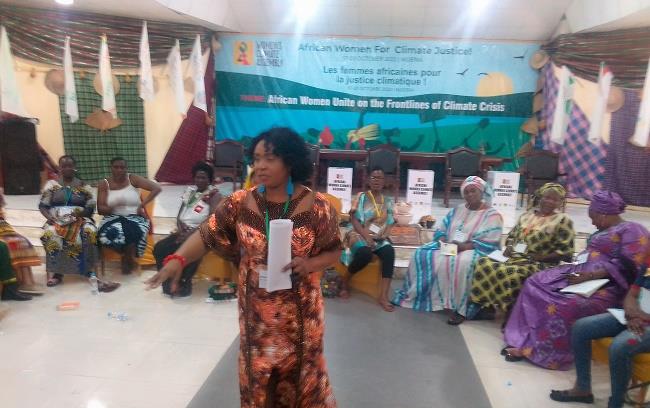The African Women Climate Assembly was hosted in Nigeria from October 17 to 21, 2022 in Port Harcourt, the Rivers State capital. Delegates comprised some 150 women activists from 13 countries including Burkina Faso, Cameroon, Senegal, Sierra Leone, Benin Republic, Mali, Togo, DR Congo, Zimbabwe, Mozambique, South Africa, Niger and Nigeria.

Organisers of the event, Kebetkache Women Development and Resource Centre, submitted: “These are the women who shoulder worsening impacts of climate change disasters in their daily lives despite having contributed nothing at all to the growing climate crises.”
The group emphasised the fact that the Climate Assembly marks the beginning of a permanent Assembly of African women for climate and development justice.
“Climate change has greater impact on women who are most reliant on natural resources for their livelihoods and who have the least capacity to respond to natural hazards,” according to a presentation. It also explained that the implications of the climate change for women, especially those living in the rural areas, have not been fully understood.
In a two-page statement released at the end of the Assembly, participants were described as “women activists who are impacted by destructive extractives such as mining, oil and gas extraction, industrial agriculture, fishing and forestry, mega energy and infrastructural projects”.
In a breakout and experience sharing session, the Senegalese delegation said that “the rivers are shrinking because of excessive heat and our fishes have gone far into the sea”, while the Cameroonians said, “we noticed a kind of erosion which resulted in deaths and economic losses our lands are less fertile”.
On August 14, 2017, said the Sierra Leonian delegation, there was a mud slide in Freetown because of climate change, many people died. “We no longer have rainy and dry seasons; before we had rainy and dry seasons but not anymore. Now it is very short harmattan, wild winds and wild storms,” said members of the delegation.
“Everything has been changing; pond waters have been polluted by chemical residue, plants are disappearing from nature. Changes in season has put food security at risk. In Burkina Faso beans is no more,” lamented another delegate. “When you need rain, you don’t see rain. But when you want to preserve the seeds there is too much rain. Government is replacing our natural seeds with GMO seed which may cause cancer.”
The delegate from DR Congo believes that human activities are exacerbating the problems of climate change. “For instance, in central Congo we gave land for the construction of the Inga Dam. We the community live in abject poverty. No schools, no hospital, we have nothing despite giving our land. The government has informed us that there would be a 3rd phase of Inga. But the women are asking ‘where is the comeback, we have as women? For giving their land.’ We have not seen all the good things they promised our communities. And women have also noticed that decision makers and investors are going to the site without discussing with the women, but we will tell them that we are not the women of yesterday.”
The four-day event provided participants the critical space to centre African women’s voices and enable women to share their experiences; build new critical knowledge to inform strategies for resistance and deepen Pan African solidarity.
While sharing her own experiences, a delegate from Cote d’Ivoire who was simply identified as Jose speaking of mining exploitation, said: “All our species have disappeared, women bear the brunt; women are abused, and beaten. Women should stand up and say, enough is enough. It has been 16 years of exploitation; women must be heard, and things have to change.”
The activists asserted their rights to free, prior and informed consent as well as their “Right to Say No to destructive development agendas that harm the communities and rob them of their lands and livelihoods in the name of profit for a few”.
In the concluding session of the event, participants made far-reaching demands from their National Governments in the light of the forth coming COP27 coming up at Sharm el-Sheikh in Egypt. A key demand is to immediately put an end to gas flaring.
“We don’t want the gas burning any more. Let us have our lives today because we don’t know what will happen to our next generation and their times will be even worse than this,” the Nigerian delegation demanded.
Looking back at the recent happens in Nigeria especially the disastrous flooding which has ravaged the country and the hardest hit being the Niger Delta and being compounded by gas flaring and massive oil spills which has killed over 3,000 people and displaced an estimated population of over a million people, is a way of telling the world that the time to tackle the root causes of climate change is Now.
The Senegalese Delegation demanded: “Our Government at COP27 should take into consideration where the oil and other resources exploitation will happen because our communities should not suffer for this. Communities’ Rights Matter! Give to communities what belongs to them. Women must be involved in negotiations wherever there are decisions to be made oil and resources. We women are responsible for life – we handle the households, livelihoods and everything essential for daily survival and so we must be present at negotiations too.”
Finally, the Women Climate Assembly called for unity among African women, to influence their governments to have an African agenda for the COP27 at Sharm el-Sheikh in Egypt. They also called for the deepening of extensive movements of African women in countries and at Pan African level resisting extractive activities and demanding sovereign debts cancellations, organising for climate debt to be paid by historically responsible countries and polluters.
These, the women said, is the “road to a just and equitable future”. The time for climate justice is now, they concluded.
By Dandy Mgbenwa
